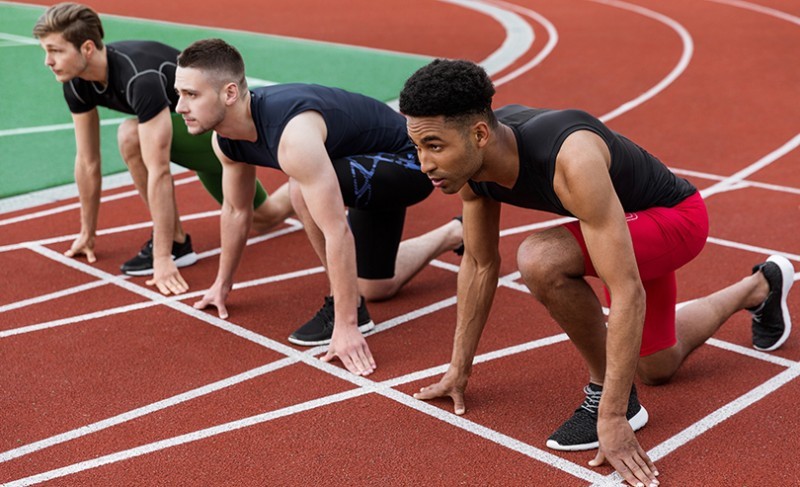Athletes, perhaps more than any other group of people, are committed to and enthused about – some even obsessed – with learning all they can about nutrition and discovering that winning edge. The field of nutrition in the sports world has become cutting edge, with athletes – mostly those at the professional level – constantly in search of whatever nutrition will help them in their never-ending quest to be bigger, faster, stronger. But not all athletes are Olympic competitors, pro basketball stars, or even the second-string quarterback at a Division III school. Many of us are content to walk or jog 15 miles a week or at least to be a weekend warrior playing pickup basketball, touch football, 18 holes of golf Saturday and/or Sunday, or to play in a local rec softball league. Whatever our athletic lot in life, though, we share an interest in proper nutrition. We seek what can give us a boost on the playing field and even allow us to recover quicker after a workout at the gym or an intense yoga or jazzercise class. Almost all of us are an athlete of some sort, at some level. What that means, though, is that in search of proper sports nutrition,, we must commit to staying abreast of the latest relevant findings and then applying those findings, as National Institutes of Health (NIH) puts it. That is, sports nutrition is an ever-changing science, and you must stay informed and prudent about what you are putting into your body.
The Importance of a Nutrition Plan
Per medicinenet.com, any athlete's diet – and we're including amateur jocks and weekend warriors in this – should be one that provides the right amount of energy, essential vitamins, minerals, protein, and adequate water. Proper hydration – before, during, and after the game, workout, or jog around the neighborhood – is critical. This means having a defined plan of what to eat and drink, how much, and when. Nutritional supplementation is a key part of sports nutrition, too, especially for those who might have certain health conditions that require such supplementation. There's also the matter of the intensity of a workout or training program, requiring some athletes to have higher calorie and fluid guidelines. An athlete's training table should include fitting amounts of minerals, protein, vitamins, and carbohydrates. Per medicinenet.com, health and nutrition professionals say that 55-60 percent of an athlete's calories should come from carbohydrates with no more than 30 percent from fat – some fat is good in any active person's diet – and the remaining 10 percent from protein. Any diet plan you put together that accounts for athletic activity should include input and guidance from a nutritional expert, as well as your personal physician. Loading up on carbohydrates ( carbo-loading ), for instance, which involves increasing the amount of glycogen in muscles, can be beneficial for athletes such as those who participate in endurance events, like distance running, triathlons, or bike races. But that doesn't mean filling a bowl with spaghetti and other pasta and then scarfing it down an hour or two before the big event. Timing and quantity are key. Again, first talk to a sports nutrition expert as well as your physician.Other Sports Nutrition Tips
Here are a variety of other things to think about in formulating your personalized sports nutrition plan:- Sports drinks. There is a wide variety of sports drinks available on the market. Check out these sports drinks carefully, well before the event. Per medicinenet.com, if your athletic event lasts 90 minutes or more, you can benefit from a sports drink that has 18 grams of carbohydrate for every eight ounces of fluid. This should allow you to consume enough carbohydrate to store proper levels of glycogen while giving you sufficient hydration. Sports drinks should also contain ample sodium and potassium, also known as electrolytes, which are needed for optimal functionality of your nerves and muscles.
- Iron. If you have low iron levels in your body, you might tire prematurely during your event or activity. Iron is found in hemoglobin, which is a part of red blood cells that are tasked with supplying oxygen from the lungs to all reaches of the body, including your muscles. An iron deficiency can be manifested in symptoms that include fatigue, irritability, dizziness, and headaches, per medicinenet.com. Red meat, fish, and poultry are good sources of iron, as are fortified cereals, beans, and leafy green veggies.
- Dietary supplements. Nutritional supplements are a common and necessary part of an athletic-oriented diet. However, think of them as supplements to your diet and not as replacements for the balanced diet of foods you should be consuming. Some nutritional supplements worth looking into in terms of athletic activity benefits include creatine, ribose, amino acids, glutamine, protein, calcium, green tea extract, and L-carnitine, per verywellfit.com.
- Water. Proper hydration management is vitally important for active adults and athletes of all ages. That means drinking sufficient amounts of water during the day and in conjunction with your activity or athletic event. Per verywellfit.com, water is considered the most important nutritional ergogenic aid for anyone involved in athletic activity. Ergogenic aids are any substances, drugs, or techniques used to enhance athletic performance. Weight lost through sweat of more than 4 percent of your body weight during exercise or athletic activity can lead to heat illness or worse.

